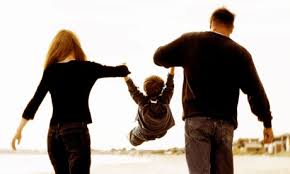 If your children watched a videotape of you and their other parent trying to work out who was going to drive them to soccer practice or why their homework is missing, what would they think? Would they see two parents who loved them and were working together to make their childhood smooth and rewarding? Or would they see two arch-enemies trading verbal jabs and low blows? Would they see you working to solve the problems that arise in childhood or would they see you making their problems worse?
If your children watched a videotape of you and their other parent trying to work out who was going to drive them to soccer practice or why their homework is missing, what would they think? Would they see two parents who loved them and were working together to make their childhood smooth and rewarding? Or would they see two arch-enemies trading verbal jabs and low blows? Would they see you working to solve the problems that arise in childhood or would they see you making their problems worse?
Joy Bennett is an expert on divorce and children. She has benefitted from many different types of training to help parents work together after divorce. She knows that every interaction you have with your ex teaches messages to your kids. They learn from you…how to be responsible adults, whether to trust other people, how to behave towards other people, and what’s important in life. What are you teaching your children in the ways that you interact with their other parent?
Joy stays current on the volumes of research about divorce and kids. She knows that one of the best predictors of a good outcome for children of divorce is having parents who can communicate. Parents need to share information about health, school, and behavioral or social issues. Joy can help you figure out the best methods to share information, how much to share, and what to leave out. She can help you remove “the fighting words” from your communications. After years of marriage, you know how to push each others’ buttons. But do you know how to stop? Button-pushing is not good co-parenting.
Joy also knows that one of the best predictors of a poor outcome for children of divorce is having parents with a continuing high level of conflict. High-conflict parents are not just those who fight in front of their children, they’re also those whose tension is so high that they don’t speak to one another, but you could cut the tension with a knife. Highly conflicted parents need to recognize that they might be engaging in subtle behaviors which impact their children. Before children learn to speak, they become masters of reading body language. Your subtle non-verbal behaviors speak volumes to them. What is it saying?
After divorce, parents need to accept that there is more than one “right way” to parent. Parents must become less rigid and more accepting. Every parent has certain strengths and benefits they bring to parenting. Learn to recognize those in your parenting partner. Because Joy is trained from a strengths perspective, she can help you see the positive parenting traits of your parenting partner and respect those.
Co-parenting after divorce is very difficult. It comes on the heels of years of anger towards one another, and it involves the most precious people in your life—your children. It’s worth learning to do it well. The messages you teach your children by the way that you co-parent last a lifetime. Teach them well.